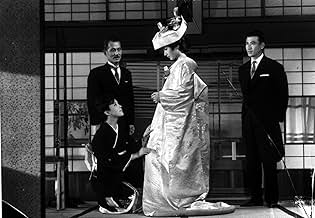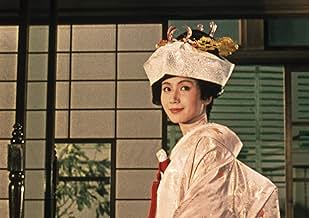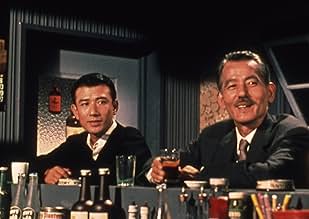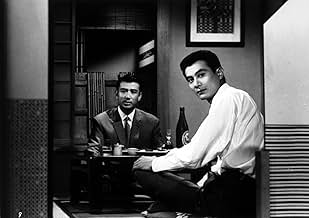Un viudo entrado en años acuerda el matrimonio de su única hija.Un viudo entrado en años acuerda el matrimonio de su única hija.Un viudo entrado en años acuerda el matrimonio de su única hija.
- Premios
- 4 premios y 1 nominación en total
Reseñas destacadas
Hirayama frequently meets his old friends Kawai (Nobuo Nakamura) and Professor Horie (Ryûji Kita), who is married with a younger wife, to drink in a bar. When their school teacher Sakuma (Eijiro Tono) comes to a reunion of Hirayama with old school mates, they learn that the old man lives with his daughter that stayed single to take care of him. Michiko lives a happy life with her father and her brother, but Hirayama feels that it is time to let her go and tries to arrange a marriage for her.
"Sanma no aji" is the last movie of the Japanese director Yasujiro Ozu about his favorite theme: family and human relationship. Actually he revisits in color thirteen years later, the theme of the wonderful "Banshun". Both story lines are about an old father that realizes that he can not hold his daughter with him anymore and she needs to get married with an arranged marriage as a natural order of life in the traditional Japan. The beautiful and touching story shows also the contrast between the traditional and the newer generation formed by consumers and is supported by awesome performances and the use of magnificent camera work, with symmetrically framed images. Last but not the least, it is impressive how the characters drink in this movie. My vote is eight.
Title (Brazil):"A Rotina Tem Seu Encanto" ("The Routine Has its Charm")
Unlike the earlier movie, this one isn't about the daughter, but the father. Before the war Ozu had worked in many genres, with his largest influence seeming to be Leo McCarey. After the war he settled into a series of meditations of the Japanese family in a changing Japan, concentrating on first one member, then the other. As he grew older, so did the focus of the story.
Some people say Ozu's technique, which had favored ecstatic moving shots in the late 1920s, grew simpler. He set his camera on the floor, looking up at his subjects, and let the drama and comedy play out before it. I don't think so. I think that his interest in story grew less and his interest in character increased, and he found the tricks of camera movement, crane shots and structuring the background for composition, to be a distraction. And so, here, we come to know Chishu Ryu's character, even though he says little, orders nothing, yet clearly commands love and respect from all who know him.
Ozu's mother died, and he was trying to deal with cancer while he worked on his next movie when he died on his sixtieth birthday, December 12, 1963. For lovers of his films, there would be no WINTER. Instead, we may imagine the bar around the corner, the same family -- with Chishu Ryu perhaps now a great-grandfather - still caring about each other and coping in a constantly changing Japan.
¿Sabías que...?
- CuriosidadesYasujirô Ozu: [static camera] There is not a single camera movement in the entire film, as in many of Ozu's films.
- Citas
[English subtitled version]
Yoshitaro Sakamoto: If Japan had won the war, how would things be?
Shuhei Hirayama: I wonder.
Yoshitaro Sakamoto: More whiskey! Bring us the whole bottle. If we'd won, we'd both be in New York now. New York. And not just a pachinko parlor called New York. The real thing!
Shuhei Hirayama: Think so?
Yoshitaro Sakamoto: Absolutely. Because we lost, our kids dance around and shake their rumps to American records. But if we had won, the blue-eyed ones would have chignon hairdos and chew gum while plunking tunes on the shamisen.
Shuhei Hirayama: But I think it's good we lost.
Yoshitaro Sakamoto: You think? Yeah, maybe you're right. The dumb militarists can't bully us anymore.
- Créditos adicionalesThe film title and credits are set against a backdrop of painted fronds.
Generally Yasujirô Ozu films have the credits placed before a backdrop of plain sackcloth.
- ConexionesFeatured in Yasujirô Ozu, le cinéaste du bonheur (2023)
- Banda sonoraGunkan kôshinkyoku
(Warship March)
Written by Tôkichi Setoguchi
Selecciones populares
- How long is An Autumn Afternoon?Con tecnología de Alexa
Detalles
- Fecha de lanzamiento
- País de origen
- Idioma
- Títulos en diferentes países
- El gust del peix a la tardor
- Localizaciones del rodaje
- Tokio, Japón(setting of the action)
- Empresa productora
- Ver más compañías en los créditos en IMDbPro
Taquilla
- Recaudación en todo el mundo
- 27.189 US$


































